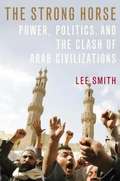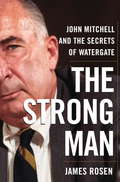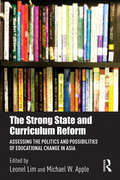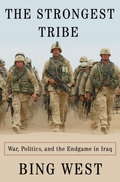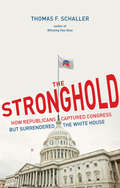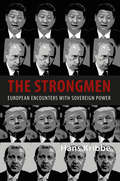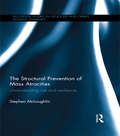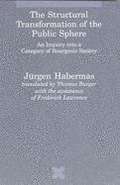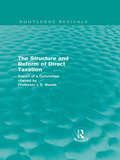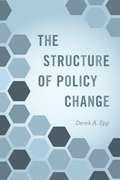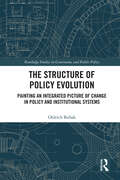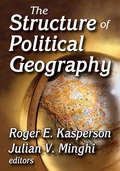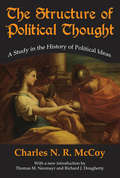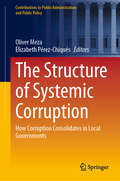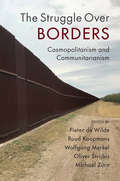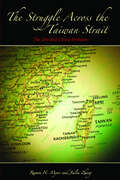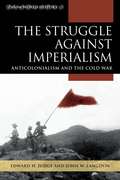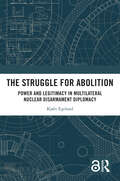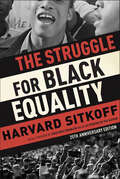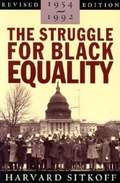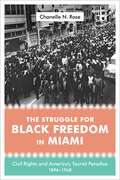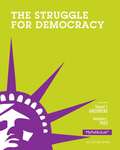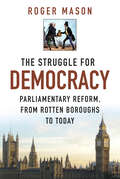- Table View
- List View
The Strong Horse: Power, Politics, and the Clash of Arab Civilizations
by Lee SmithIn a provocative, timely book, a noted journalist and expert on Arab-American affairs overturns long-held Western myths about the Arab world, and offers a doctrine to help the United States correct its assumptions concerning the region. Wanting to know why September 11 happened, journalist Lee Smith moved to Cairo. There, he discovered that the standard explanation-a clash of East and West led to the attacks-was simply not the case. As Smith outlines inThe Strong Horse, the problems of the Middle East have little to do with Israel, the United States, or the West in general. The strife exists within the Arab world itself. Through clear-eyed analysis, Smith explodes the many myths permeating Americans' understanding of the Arab world: colonialism spurred the region's ongoing turmoil; Arab liberalism is waiting for U. S. intervention; technology and democracy can be transforming. In response to these untruths, Smith offers what he terms the “Strong Horse Doctrine”-that Arabs want to align themselves with strength, power, and violence. Given America's ongoing interest in the Middle East, Smith says America needs to be the strong horse in order to reclaim its role there, and only by understanding the nature of the region's ancient conflict can we succeed.
The Strong Man: John Mitchell and the Secrets of Watergate
by James RosenRosen (a Washington correspondent for Fox News) presents a biography of Richard Nixon's Attorney General John Mitchell, whose conviction in the Watergate cover-up trial provided the dubious honor of being the highest-ranking US government official to have to serve time in prison. Rosen addresses a host of previously unanswered questions, including whether Mitchell ordered the Watergate break-in, Mitchell's role in the SEC case against fugitive financier Robert Vesco, the role of the Central Intelligence Agency in Watergate, the response of Mitchell to the discovery that the Joint Chiefs of Staff were spying on Nixon and Henry Kissinger, Mitchell's activities concerning school desegregation and antitrust laws, and Mitchell's response to Kent State. Also covered is Mitchell's involvement in cases concerning Daniel Ellsberg, Lt. William Calley, Jimmy Hoffa, Robert Vesco, Abe Fortas, Clement Haynsworth, John Lennon, the Berrigan Brothers, the Black Panthers, and ITT. In the end, Mitchell is portrayed as a man who repeatedly served as a restraining influence on the darker urges of Richard Nixon and as a victim of many unfair charges concerning the Watergate affair, although some unpunished crimes are also noted, such as his illegal intervention with South Vietnamese officials at the 1968 Paris peace talks, his false testimony before the Senate concerning the ITT case, and his false statements to the FBI agents investigating the 1969-71 Kissinger wiretaps. Annotation ©2008 Book News, Inc. , Portland, OR (booknews. com)
The Strong State and Curriculum Reform: Assessing the politics and possibilities of educational change in Asia (Routledge Research in Education Policy and Politics)
by Michael W. Apple Leonel LimAs Asian education systems increasingly take on a stronger presence on the global educational landscape, of special interest is an understanding of the ways in which many of these states direct their schools towards higher achievement. What is missing, however, are accounts that take seriously the particular construction of the strong, developmental state witnessed across many Asian societies, and that seek to understand the politics and possibilities of curriculum change vis a vis precisely the dominance of such a state. By engaging in analyses based on some of the best current social and cultural theories, and by illuminating the interactions among various state and non-state pedagogic agents, the chapters in this volume account for the complex post-colonial, historical and cultural consciousnesses that many Asian states and societies experience. At a time when much of the educational politics in Asia remains in a state of transition and as many of these states seek out through the curriculum new forms of social control and novel bases of political legitimacy, such a volume offers enduring insights into the real if not also always relative autonomy that schools and communities maintain in countering the hegemonic presence of strong states.
The Strongest Tribe: War, Politics, and the Endgame in Iraq
by Bing WestFrom one of the most respected combat reporters in America comes a gripping battlefield history of how the U. S. military corrected its mistakes in Iraq and opened a path to victory.
The Stronghold
by Thomas F. SchallerOnce the party of presidents, the GOP in recent elections has failed to pull together convincing national majorities. Republicans have lost four of the last six presidential races and lost the popular vote in five of the last six. In their lone victory, the party incumbent won--during wartime--by the slimmest of margins. In this fascinating and important book, Thomas Schaller examines national Republican politics since President Ronald Reagan left office in 1989. From Newt Gingrich's ascent to Speaker of the House through the defeat of Mitt Romney in 2012, Schaller traces the Republican Party's institutional transformation and its broad consequences, not only for Republicans but also for America. Gingrich's "Contract with America" set in motion a vicious cycle, Schaller contends: as the GOP became more conservative, it became more Congress-centered, and as its congressional wing grew more powerful, the party grew more conservative. This dangerous loop, unless broken, may signal a future of increasing radicalization, dependency on a shrinking pool of voters, and less viability as a true national party. In a thought-provoking conclusion, the author discusses repercussions of the GOP decline, among them political polarization and the paralysis of the federal government.
The Strongmen: European Encounters with Sovereign Power
by Hans KribbeSeven decades after the liberation of Europe, the strongmen of global politics are back, dominating not only the headlines but international relations, the global economy, and the world's security. The strongman has a style and strategy of leadership that is anathema to the liberal democratic norms and practices of Europe. He (it is always he) challenges principles of consensus and collaboration, willingly tears up trade agreements, invades territory, and seeks to provoke and disrupt the status quo in order to achieve advantage. Such behaviour confounds and frustrates his counterparts abroad and yet, as this book shows, it can be anticipated, even understood, offering hope for dealing with and neutralizing it. Hans Kribbe draws on a range of political ideas to provide insight into the strongman's seemingly irrational and idiosyncratic behaviour and to better understand how he wields power and to what end. With the world's largest economies, including Europe's key ally, as well as strategic neighbouring states controlled by strongmen - Xi Jinping, Donald Trump, Vladimir Putin, and Recep Tayyip Erdogan - Europe must learn to adapt and respond if it is to beat them at their own game.
The Structural Prevention of Mass Atrocities: Understanding Risk and Resilience (Routledge Studies in Genocide and Crimes against Humanity)
by Stephen McLoughlinThis book offers a different approach to the structural prevention of mass atrocities. It investigates the conditions that enable vulnerable countries to prevent the perpetration of such violence. Structural prevention is commonly framed as the identifying and ameliorating of the ‘root causes’ of violent conflict, a process which typically involves international actors determining what these root causes are, and what the best courses of action are to deal with them. This overlooks why mass atrocities do not occur in countries that contain the presence of root causes. In fact, very little research has been conducted on what the causes of peace and stability are, particularly in relatively countries located in regions marred by civil war and mass atrocities. To better understand how such vulnerable countries prevent the commission of mass atrocities, this book proposes an analytical framework which enables not only an understanding of risk which arises from the presence of root causes, but also of the factors that build resilience in countries, and consequently mitigate and manage such risk. Using this framework, three countries – Botswana, Zambia and Tanzania, are analysed to account for their long term stability despite their location in neighbourhoods characterised by decades of civil war, ethnic repression and mass atrocities. This work is a significant contribution to the field of genocide studies and crimes against humanity and will be of interest to students and scholars alike.
The Structural Transformation Of The Public Sphere: An Inquiry Into A Category Of Bourgeois Society (Studies In Contemporary German Social Thought)
by Jurgen Habermas Thomas BurgerThis is Jurgen Habermas's most concrete historical-sociological book and one of the key contributions to political thought in the postwar period. It will be a revelation to those who have known Habermas only through his theoretical writing to find his later interests in problems of legitimation and communication foreshadowed in this lucid study of the origins, nature, and evolution of public opinion in democratic societies.
The Structure and Reform of Direct Taxation (Routledge Revivals)
by James E. MeadeFirst published in 1978, The Structure and Reform of Direct Taxation presents the full findings and recommendations of the ‘Meade’ committee set up by The Institute for Fiscal Studies. It represents the most important contemporary examination of the structure of UK taxation and direct taxation systems in general. The results of two years’ intensive research and discussion by this independent committee are presented as a report under the joint authorship of an outstanding team of tax experts. The committee brought together professional practitioners-lawyers, accountants and taxation administrators-and academic specialists in fiscal studies, and here provides a unique review of direct taxation which is comprehensive, singularly original and full of good sense.The book begins with a return to first principles, restates the objectives of a good tax system and analyses existing structures. It goes on to examine the feasibility of basic reforms which would allow the system to become more straightforward in operation and which would base taxation on what individuals take out of the economy rather than on what they put into it.
The Structure of Policy Change
by Derek A. EppWhen the Soviet Union launched Sputnik, the Red Scare seized the American public. While President Eisenhower cautioned restraint, his hand was forced, and NASA’s budget had increased five thousand percent over its pre-Sputnik levels by the time President Kennedy proposed landing a man on the moon. Spending on the space race is in no way unique; Almost every policy area has its own Sputnik-type story, where waves of popular support for an idea (or disillusionment with a previous one) created new political priorities, resulting in dramatic changes to the budget or compelling agencies to respond quickly with little knowledge or preparation. Is this instability an inherent feature of the policy process, or is it possible for an agency to deal with problems in a way that insulates it from swings in public opinion and thus imposes some stability on the decision making process? Derek A. Epp argues that some agencies can indeed do that and that instability is at least partially a function of poor institutional design. While it is inherently more challenging to maintain stability around complex problems like immigration or climate change, the deliberative process itself can affect the degree of stability around an issue. Epp looks at whether agencies follow a deliberative model for decision making, in which policies are developed by means of debate among a small group of policymakers, or a collective model, in which the opinions of many people are aggregated, as with the stock market. He argues that, in many instances, the collective model produces more informed and stable policy outcomes that can be adapted more readily to new information and changing public priorities.
The Structure of Policy Evolution: Painting an Integrated Picture of Change in Policy and Institutional Systems (Routledge Studies in Governance and Public Policy)
by Oldrich BubakThis book advances novel tools for the study, analysis, and development of public policy, essential in a world of growing diversity, complexity, and accelerating change. Inspired by research in technology innovation, the book brings its forward applications into the studies of policy and institutional systems, answering, among others, the disciplinary need for a common model of change. Relating together the dynamics and the structure of policy evolution, the unified approach offers scholars important new insights into the logics and direction of policy development while advancing policy practitioners’ capacity for forecasting and optimizing designs. Analyzing social and labour market policy development across two model jurisdictions, the United Kingdom and Denmark, it substantiates the new approach while demonstrating its significance to the study of welfare modernization and to policy scholarship more generally. The book will be of key interest to scholars and students of policy and institutional development, policy analysis, and public administration and management, as well as comparative policy, evolutionary and complexity policy, and social policy and welfare state modernization research.
The Structure of Political Geography
by Julian V. Minghi Roger E. KaspersonThis volume seeks to provide a sense of purpose and order to the study of political geography. The editors devise a conceptual structure for the field, bringing political geography into line with trends in contemporary geography as a whole and with other social sciences. Not only do the selections contain a wide variety of contributions from other fields, but the introductory essays and annotated bibliographies suggest related research. The structure of the book enjoys close parallels in other social sciences.The organization of the book reflects the editors' definitions and structuring of political geography. Part I, ""Heritage,"" includes works that have contributed to the theoretical development of the field. Part II, ""Structure,"" comprises the concern to which political geographers have devoted most of their past attention. Parts III and IV, ""Process"" and ""Behavior,"" form the subject where much future theoretical and practical effort is needed. Part V, ""Environment,"" provides the context in which spatial structure, process, and behavior occur.The Structure of Political Geography includes selections from sociobiology, history, international relations, political economy, political science, social psychology, and sociology. The classics in the field are an essential inclusion since the book would be incomplete without them. The selections in the volume, originally published in 1971, remain useful and pertinent to political geographers of diverse persuasion and to social scientists interested in geographical approaches. The fact that there is a clear focus and conceptual interdependence in political geography is the volume's greatest contribution.
The Structure of Political Thought: A Study in the History of Political Ideas (The\library Of Conservative Thought Ser.)
by Charles McCoyOriginally published in 1963, this classic book is a rethinking of the history of Western political philosophy. Charles N. R. McCoy contrasts classical-medieval principles against the "hypotheses" at the root of modern liberalism and modern conservativism.In Part I, "The Classical Christian Tradition from Plato to Aquinas," the author lays the foundation for a philosophical "structure" capable of producing "constitutional liberty." Part II, "The Modern Theory of Politics from Machiavelli to Marx," attempts to show, beginning with Machiavelli, the reversal and destruction of the pre-modern "structure" postulated in Part I.McCoy stresses the great contributions of Aristotle to political thought found in his more familiar Ethics and Politics, but also includes key insights drawn from Metaphysics and Physics. These contributions are developed and perfected, McCoy argues, by Augustine and Aquinas. Two other important features include McCoy's epistemological insights into Plato's work that will be new to many readers and the author's juxtaposition of traditional natural law with "the modernized theory of natural law." The modern account of autonomous natural law, in McCoy's view, helps explain the totalitarian direction of key aspects of modern political thought. This classic volume on the origins of modern philosophical thought remains a standard in the field.
The Structure of Systemic Corruption: How Corruption Consolidates in Local Governments (Contributions to Public Administration and Public Policy)
by Oliver Meza Elizabeth Pérez-ChiquésThis book presents a series of interconnected studies designed to understand systemic corruption in local governments. Coined as the Corruption Consolidation Framework (CCF), this novel approach elucidates how corruption becomes the rule in formal institutional settings and further consolidates. The CCF analyzes the problem along four dimensions, offering a unique contribution to make sense of a complex problem without oversimplifying the subject. Chapters in the book explore the CCF in case studies conducted across Latin American municipalities in Mexico, Brazil, Chile, and Puerto Rico, however, authors believe the CCF is applicable around the world both in the Global South and in Western countries. The volume is a promising tool for the academic community in the public administration, policy studies, and local government fields. It can also be used in undergraduate and graduate courses on corruption, governance, local governments, and Latin American studies. Finally, it offers a general roadmap to citizens and policymakers about what can be done in cases where corruption has become the rule of the game in local governments. Since the famous book of Klitgaard Corrupt Cities, the world has been waiting for a follow-up on municipal corruption. This collection of LA studies crosses the borders of the continent and makes indispensable reading for students of corruption and local government everywhere -- Alina Mungiu-Pippidi, Professor at LUISS Guido Carli. Author of "The Quest for Good Governance. How Societies Build Control of Corruption" The book fills this gap and takes the reader on an enlightening journey into the world of systemic corruption in municipalities through a collection of well-written chapters with a concept that unifies these cases in a theoretically grounded yet highly applicable framework. -- David Jancsics, Professor at San Diego State University. Author of "Sociology of Corruption: Patterns of Illegal Association in Hungary" Theoretically rich and empirically rigorous, this volume provides a fresh, grounded perspective on the governments residents most often engage. It is a must-read for scholars and practitioners alike. -- Patricia Strach, Professor at Albany, State University of New York. Author of The Politics of Trash: How Governments Used Corruption to Clean Cities, 1890-1929 The framework of corruption consolidation helps explain appropriately how this phenomenon can become the status quo of governance in institutionally weak public administrations. It is a must-read to analyze and understand corruption in the global South. -- Pablo Sanabria-Pulido at Florida Atlantic University.
The Struggle For Democracy
by Edward Greenberg Benjamin PageThe Struggle for Democracy offers students the tools they need to critically analyze our political system and make judgments about how well our government works. Taking a fresh approach to common American government topics, authors Edward Greenberg and Benjamin Page provide an analytical framework for understanding how politics and government work, and encourage students to consider the questions “How democratic are we?” and “Can government do anything well?” In order to boost student engagement with key concepts, the 2016 Elections and Updates Edition incorporates coverage of contemporary issues that dominate today’s headlines, as well as the most up-to-date data.
The Struggle Over Borders: Cosmopolitanism and Communitarianism
by Ruud Koopmans Wolfgang Merkel Michael Zürn Oliver Strijbis Pieter De WildeCitizens, parties, and movements are increasingly contesting issues connected to globalization, such as whether to welcome immigrants, promote free trade, and support international integration. The resulting political fault line, precipitated by a deepening rift between elites and mass publics, has created space for the rise of populism. Responding to these issues and debates, this book presents a comprehensive and up-to-date analysis of how economic, cultural and political globalization have transformed democratic politics. This study offers a fresh perspective on the rise of populism based on analyses of public and elite opinion and party politics, as well as mass media debates on climate change, human rights, migration, regional integration, and trade in the USA, Germany, Poland, Turkey, and Mexico. Furthermore, it considers similar conflicts taking place within the European Union and the United Nations. Appealing to political scientists, sociologists and international relations scholars, this book is also an accessible introduction to these debates for undergraduate and masters students.
The Struggle across the Taiwan Strait: The Divided China Problem
by Ramon H. Myers Jialin ZhangA concise and informative history of how China divided in 1949 into two regimes, why they struggled to achieve the same political goal-reunification of China—and why their struggle today continues in a more complex and dangerous way. The authors detail how the changes brought about by the 2000 election not only intensified the conflict between the regimes but locked both sides into a new contest that increased the probability of war rather than peace.
The Struggle against Imperialism: Anticolonialism and the Cold War (Exploring World History)
by Edward Judge John LangdonThis concise and engaging text argues that the Cold War and anti-colonial movements should properly be studied and taught together, not as distinct developments, but rather as interwoven aspects of a complex global transformation. The authors provide a cogent and concise description of the post–World War II era and reveal connective dimensions of that era that remain hidden in books that focus primarily on either the Cold War or the struggles against imperial rule. It not only deals with anti-colonialism and Cold War together but also portrays the Cold War as a contest between “anti-imperialist empires,” capped by the collapse of one of them—the multicultural trans-regional Soviet realm—in a work that is engaging and accessible to both students and general readers.
The Struggle for Abolition: Power and Legitimacy in Multilateral Nuclear Disarmament Diplomacy
by Kjølv EgelandCan the genie be returned to the bottle? This book investigates the pursuit by states, civil society groups, and international organisations of nuclear abolition. Detailing the evolution of the institutional architecture for multilateral nuclear disarmament from the 1960s onwards, this book tells a story of high hopes, broken promises, and clashing views of history, security, and the future.Global nuclear politics deals in material power and security but is also shot through with contests over prestige, justice, and mutual recognition. Waves of innovation in multilateral nuclear disarmament diplomacy have typically come about on the back of crises of legitimacy within the broader nuclear order.The book concludes with a discussion of policy implications and a reflection on successes and failures in the history of multilateral nuclear disarmament. The volume will be of great interest to scholars and researchers of diplomacy, history, and politics and international relations.
The Struggle for Black Equality
by Harvard SitkoffThe Struggle for Black Equality is a dramatic, memorable history of the civil rights movement. Harvard Sitkoff offers both a brilliant interpretation of the personalities and dynamics of civil rights organizations and a compelling analysis of the continuing problems plaguing many African Americans. With a new foreword and afterword, and an up-to-date bibliography, this anniversary edition highlights the continuing significance of the movement for black equality and justice.
The Struggle for Black Equality 1954-1992
by Harvard SitkoffThe Struggle for Black Equality is an arresting history of the civil-rights movement--from the path breaking Supreme Court decision of 1954, Brown v. Board of Education of Topeka, Kansas, through the growth of strife and conflict in the 1960s to the major issues of the 1990s. Harvard Sitkoff offers not only a brilliant interpretation of the personalities and dynamics of civil-rights organizations--SNCC, CORE, NAACP, SCLC, and others--but a superb study of the continuing problems plaguing the African-American population: the future that in 1980 seemed to hold much promise for a better way of life has by the early 1990s hardly lived up to expectations. Jim Crow has gone, but, forty years after Brown, poverty, big-city slums, white backlash, politically and socially conservative policies, and prolonged recession have made economic progress for the vast majority of blacks an elusive, perhaps ever more distant goal. All Americans who strove and suffered to make democracy real come vividly to life in these compelling pages.
The Struggle for Black Freedom in Miami: Civil Rights and America's Tourist Paradise, 1896-1968 (Making the Modern South)
by Chanelle Nyree RoseOffering new insights into Florida's position within the cultural legacy of the South, The Struggle for Black Freedom in Miami explores the long fight for civil rights in one of the country's most popular tourist destinations. Chanelle N. Rose examines how the sustained tourism and rapid demographic changes that characterized Miami for much of the twentieth century undermined constructions of blackness and whiteness that remained more firmly entrenched in other parts of the South. The convergence of cultural practices in Miami from the American South and North, the Caribbean, and Latin America created a border community that never fit comfortably within the paradigm of the Deep South experience. As white civic elites scrambled to secure the city's burgeoning reputation as the "Gateway to the Americas," an influx of Spanish-speaking migrants and tourists had a transformative effect on conventional notions of blackness. Business owners and city boosters resisted arbitrary racial distinctions and even permitted dark-skinned Latinos access to public accommodations that were otherwise off limits to nonwhites in the South. At the same time, civil-rights activists waged a fierce battle against the antiblack discrimination and violence that lay beneath the public image of Miami as a place relatively tolerant of racial diversity. In its exploration of regional distinctions, transnational forces, and the effect of both on the civil rights battle, The Struggle for Black Freedom in Miami complicates the black/white binary and offers a new way of understanding the complexity of racial traditions and white supremacy in southern metropolises like Miami.
The Struggle for Democracy
by Edward Greenberg Benjamin PageTextbook on the US government, politics, and democracy.
The Struggle for Democracy (Eleventh Edition, 2012 Election Edition)
by Edward S. Benjamin I.The Struggle for Democracy provides students with an understanding of the American political process and with the tools to critically evaluate that process. This text focuses on the role that democracy has played in the American story and asks students how democracy is–or isn’t–revealed in our politics and government. It encourages students to examine how deeply connected politics and government are with historical, economic, and social influences.
The Struggle for Democracy: Parliamentary Reform, from Rotten Boroughs to Today
by Roger MasonPrior to the 1832 Reform Act the electoral system was rife with corruption and in desperate need of reform. In England and Wales only about 12 per cent of adult men had the vote and the proportion was even less in Scotland and Ireland. Women did not vote at all. A single person controlled a rotten borough that returned two Members of Parliament, and for a number of years one of them was the prime minister. Furthermore, not only did voting take place in public, so landlords could and did evict tenants who voted against their wishes, but voting qualifications also differed from place to place. With the use of many fascinating anecdotes, Roger Mason tells how we got from then to now. All the major reforms are covered: Catholic Emancipation, further Reform Acts, the end of the House of Lords veto and, of course, votes for women. This fascinating history offers a complete insight into the way we have voted from the beginnings of Parliament through to the present day.
